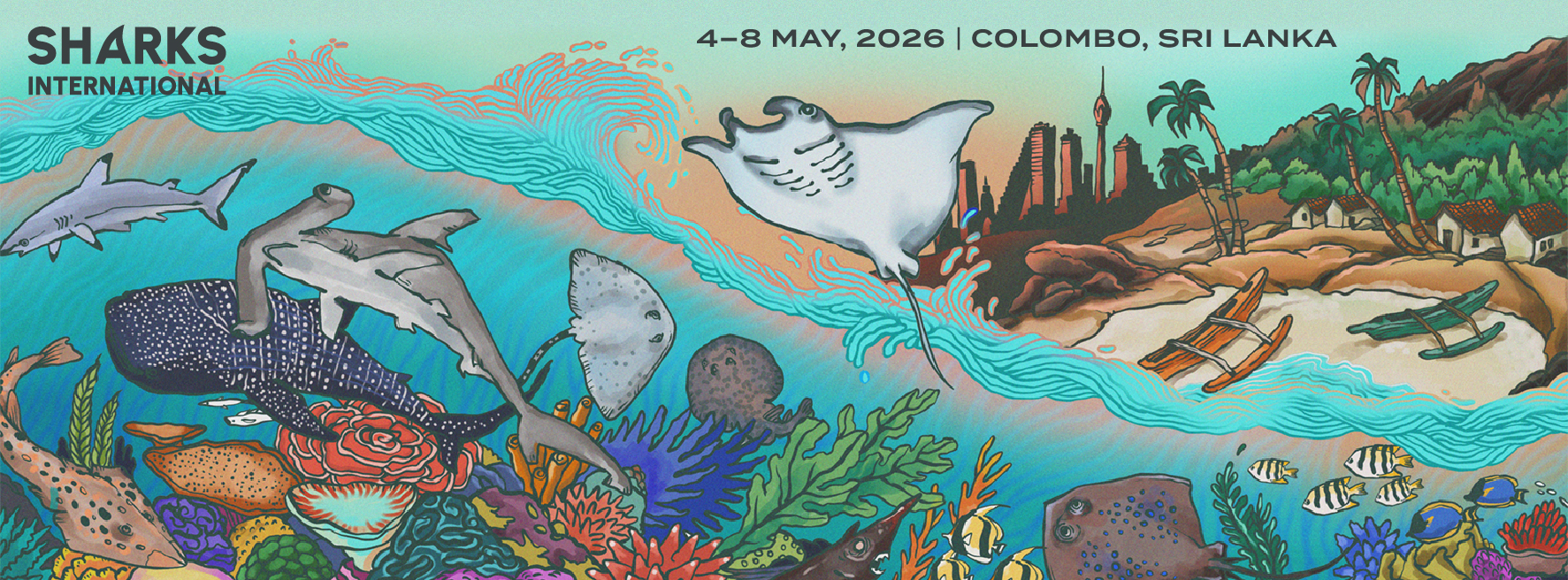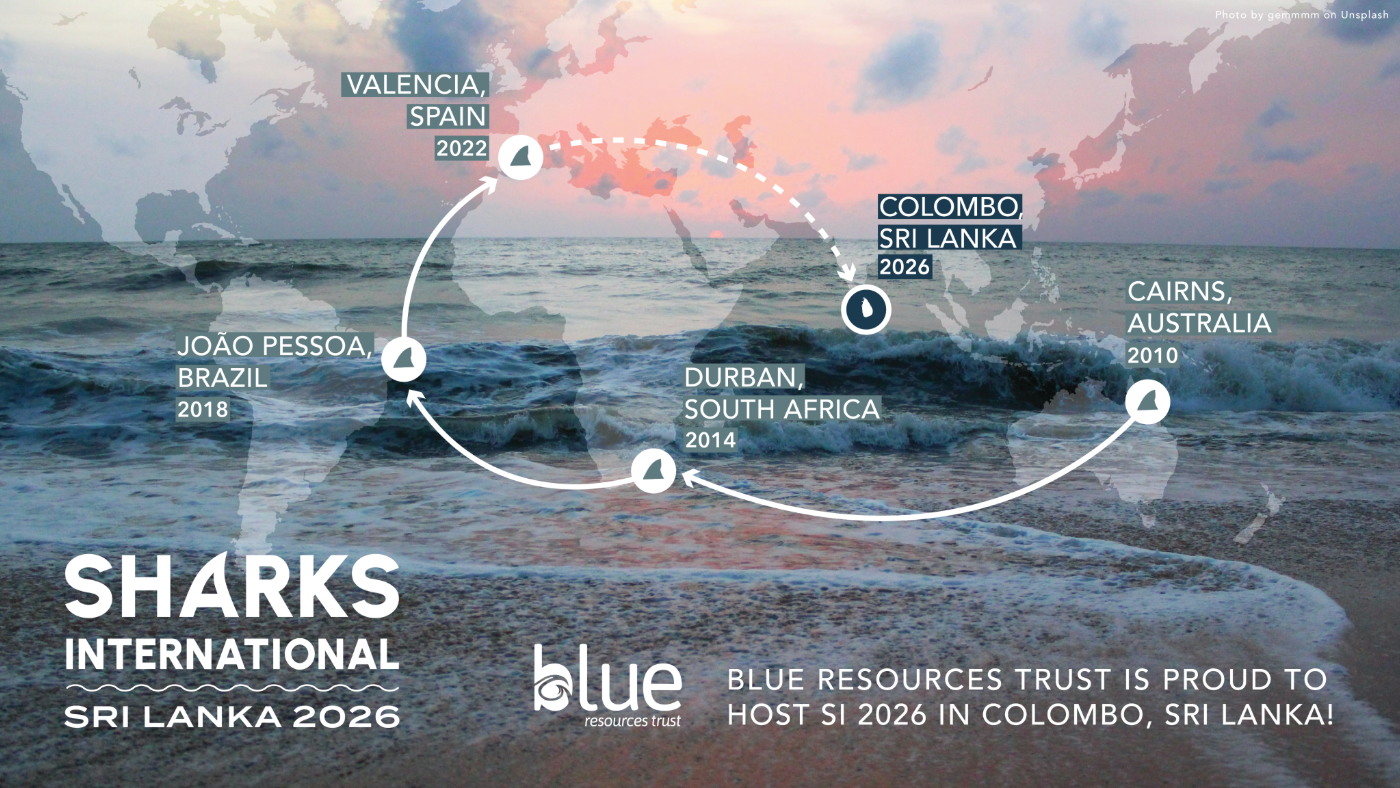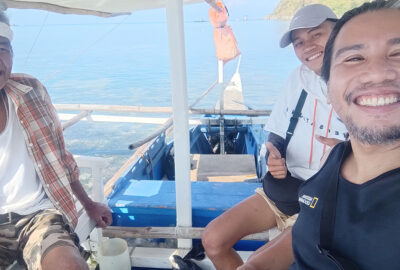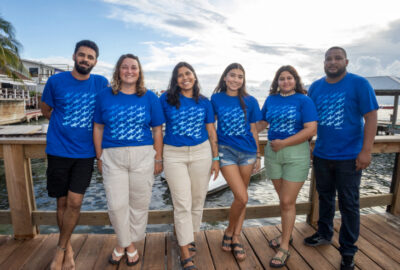An MCAF Fellow on Convening Shark Conservationists in Sri Lanka
Daniel Fernando and his organization, Blue Resources Trust, is hosting Sharks International, the largest scientific conference of its kind, for the first time in Asia in 2026. Learn more from him here.


The Aquarium’s Marine Conservation Action Fund (MCAF) supports local conservation leaders across the world who work with their communities to create lasting change for the ocean. One of the ways we support MCAF fellows and project leaders is through grants for conference travel, which provide opportunities critical for knowledge exchange, networking, and professional development.
MCAF is proud to be a sponsor of Sharks International (SI) through a multi-year grant, which supports the Blue Resources Trust team’s planning process and helps to subsidise registration fees, support student participation, and ensure a high-quality conference experience. This 2026 conference in Colombo, Sri Lanka will mark the first time that Sharks International has been hosted in Asia, presenting an exciting opportunity for elasmobranch scientists and conservationists around the globe to come together and share knowledge.
Read on to learn more about Daniel, his work with Blue Resources Trust, and Sharks International 2026.

Can you tell us about your work at Blue Resources Trust and how it connects to Sharks International 2026?
The Blue Resources Trust Fisheries and Policy Programme (BRT-FiPo), which I lead, conducts long-term monitoring of sharks, rays, and chimaeras in Sri Lanka. Our work ranges from fisheries surveys that help determine species diversity and ecology to genetic barcoding—creating the country’s first DNA reference database for this species group—to supporting conservation action to reduce their mortality. We also have a strong focus on capacity building and encouraging the next generation of shark and ray researchers. Hosting Sharks International 2026 in Colombo builds upon this foundation, creating an opportunity for participants from Sri Lanka and the wider region to share data and knowledge with a global audience, learn from other researchers’ methods, and foster partnerships that will strengthen conservation efforts across the range of these threatened species.
What is Sharks International, and why is it such an important event for the global shark and ray community?
Sharks International is the world’s largest scientific conference dedicated solely to sharks, rays, and chimaeras. Held every four years, it brings together scientists, early career researchers, students, fishery managers, policymakers, and funders to share cutting-edge research and help coordinate action plans. In an era where over one-third of elasmobranch species are threatened with extinction, Sharks International serves as a critical forum, uniting diverse stakeholders who must collaborate to translate science into effective conservation policy, ensuring these species continue to survive in the wild.
What are your goals for Sharks International 2026 in Colombo, Sri Lanka?
We have two primary goals for this conference. The first is to ensure a strong global representation. To achieve this, we are providing heavily subsidised registration rates, along with small student awards, to encourage voices from typically underrepresented countries and regions, as well as for early-career researchers worldwide. This would showcase the growing body of data that is emerging from the developing world, while enabling new collaborative partnerships. My second goal is to strengthen the science-policy interface by creating spaces where scientists and decision-makers can learn directly from one another and establish lasting connections beyond the conference. This will ensure that we work collectively, that research is designed with conservation action in mind, and that the research reaches the right hands for informed decision-making.
How will the 2026 conference differ from previous editions?
For the first time, SI2026 is being hosted in Asia, which, combined with the incredible ease of accessing Sri Lanka through an online visa system, relatively low travel costs, and subsidised registration rates, makes attendance more accessible to a huge swathe of participants who have historically faced high travel barriers. We’re also ensuring a strong focus on bridging the gap between science and policy, with sessions that focus on how policy works, current research gaps, and opportunities for engagement by both researchers and policymakers.
This conference will also introduce dual-speaker keynotes, pairing complementary leaders or emerging voices to inspire collaboration across generations. We are also having a very high number of pre- and post-conference workshops, which will offer hands-on training ranging from fisheries surveys and species identification to available technologies, effective communication, species illustrations, and driving policy.
Together, these elements will create a more dynamic, interactive, and inclusive conference.
How can Sharks International help bridge the gap between science and policy?
As scientists, we often claim that our research supports conservation efforts. However, how exactly it does this, or what the consequences are, is not always clear, sometimes even causing distrust between decision-makers and scientists. Given the status of these species, the interest by many scientists to continue studying these species in the wild, and the need for more effective management and practical enforcement, it is critical that scientists gain a better understanding of what management or policy entails, and for decision makers to learn what is feasible from a scientific context. SI2026 will weave science-policy discussions throughout the conference, emphasising the importance of collaboration to ensure that research is aligned with policy outcomes, and to ensure available data is used most effectively to further the protection of these species.
How are you and your team aiming to make the conference accessible, inclusive, and impactful?
We’ve introduced a tiered fee structure to minimise costs for delegates from low-income countries—both students and professionals—and are awarding small awards based on abstract merit. Our lineup (including presentations/posters) will strive to be diverse in background and career stage, and we’ve implemented a robust Code of Conduct and Social Media Policy to foster a respectful, inclusive atmosphere.
The centrally located venue is fully accessible and close to budget-friendly accommodation. We’re also arranging, with presenter approval, to record sessions so they can be shared online (at a later date after the conference ends) for those who cannot attend in person.
For those submitting abstracts for presentations or posters, a range of sessions covering both research and policy will be available for selection. Additionally, all participants will be eligible to attend side events taking place at lunch or in the evening, providing further opportunities to interact with funders or learn about various projects or topics of interest. These, combined with the workshops taking place on the weekends before and after the conference, will ensure a positive experience for all participants and a positive impact for this species group.
Why should researchers, conservationists, policymakers, and students attend SI2026?
SI2026 is much more than a series of talks. It will serve as a convergence point for anyone with an interest in sharks, rays, and chimaeras, encompassing a range from science to conservation action. And there is nothing that can truly replace an in-person conference, because it is the networking and relationship-building that are established mainly through conversations on the sidelines, which truly allow for new partnerships and collaborations. This is critical, not just for early-career researchers, but also for fishery managers, established scientists, and even funders.
And, of course, the fact that it is taking place in Sri Lanka provides a unique backdrop for both professional advancement and personal growth. We look forward to welcoming you all to Colombo for Sharks International 2026!




